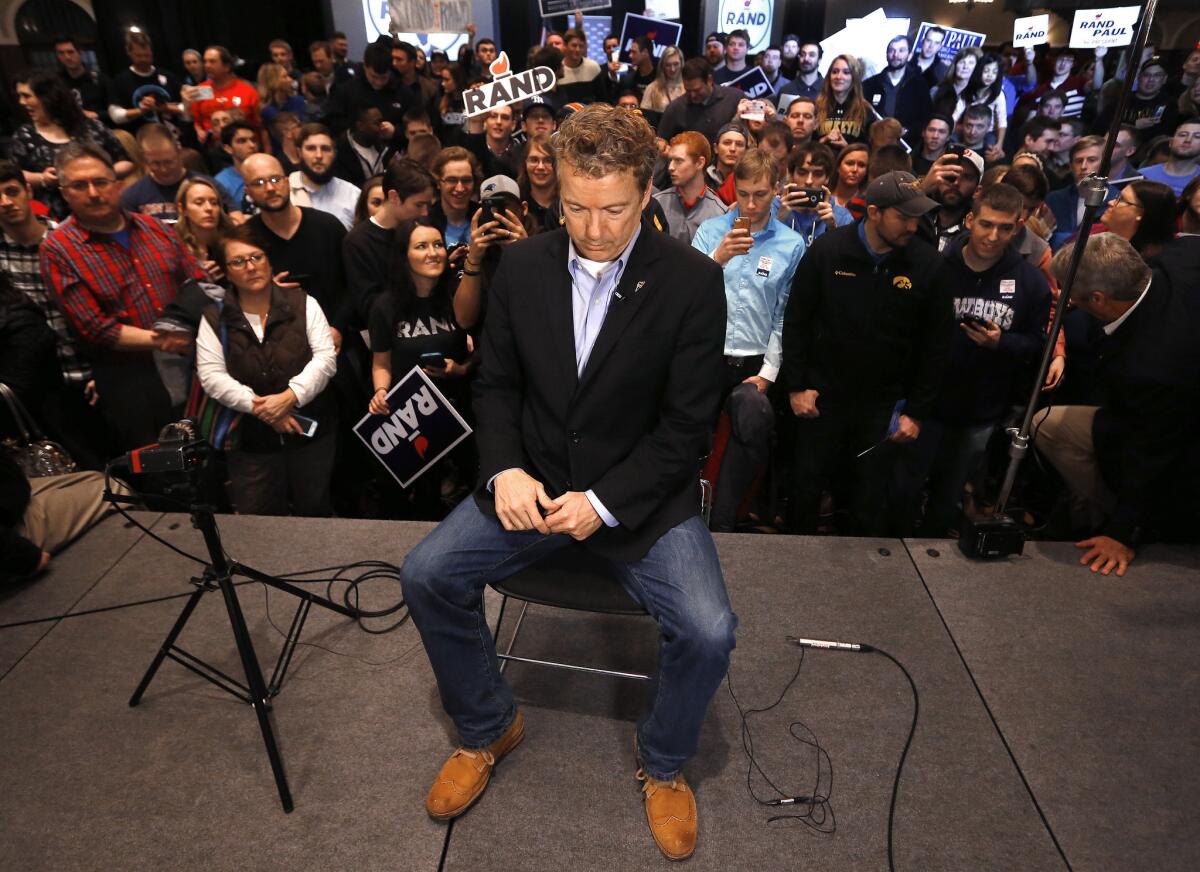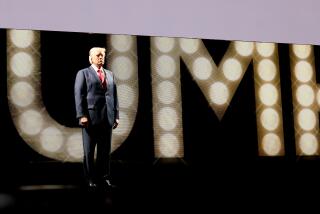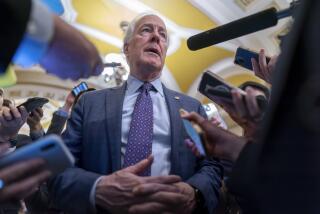Opinion: With Rand Paul gone, which candidate will ask the tough questions?

Sen. Rand Paul (R-Ky.) waits for an interview during a campaign event at the University of Iowa on Jan. 31. On Wednesday, Paul announced he was suspending his campaign for president and would seek re-election to the Senate.
- Share via
Kentucky Sen. Rand Paul isn’t the first of the 2016 GOP presidential wannabes to find the distance to the stage too far (to borrow a phrase from Pete Townshend), but his departure from the race Wednesday is the first that will really change the debate. And not in a good way.
The candidates haven’t been shy about criticizing one another, with the perceived front-runners getting the most attention. But more than any of his rivals, Paul highlighted the substantive differences among the candidates, particularly on foreign policy and budgeting.
Granted, Paul was a real outlier on foreign policy, reflecting his libertarian streak. And that may well have been his undoing, given how focused the race became on terrorism and the use of U.S. power abroad after the San Bernardino shootings. Yet his presence on the campaign trail and at the debates forced his rivals to defend the views they were embracing en masse in pursuit of a political tailwind.
While other Republicans called for increasingly extreme military action against Islamic State (with Sen. Ted Cruz winning the prize with his promise to drop enough bombs to make the sand glow), Paul stuck to his position that American intervention in the Middle East had only made matters worse there. And when other Republicans pledged to spend a king’s ransom “rebuilding the military,” Paul chastised them (and especially Sen. Marco Rubio) for running up the national debt.
Policy differences matter, even when they’re just between different gradations of conservatism.
For instance, Cruz’s reputation as the most disliked man in the collegial Senate has drawn some barbs from other candidates, and it’s worth considering whether he could establish the rapport with lawmakers he’d need to advance much of his presidential agenda. (For a reminder on why that’s important, witness the struggles of the White House’s current occupant.) But this issue is no more important than the pros and cons of Cruz’s tax proposals, his particular version of a muscular foreign policy and his approach to the growing cost of such cherished federal entitlements as Medicare and Social Security. And Paul’s departure means there will be less debate over Cruz’s positions, and everyone else’s.
At least five major candidates withdrew before Paul, and while each had his own talking points, none was so very different from the candidates still in the race. Four of the dropouts were governors who touted their records in cutting taxes and regulations, which leaves three current or former Republican governors with active campaigns, all of whom tout their records on fiscal and economic policy. The fifth erstwhile candidate is a U.S. senator who wanted to dispatch thousands of U.S. troops to wipe Islamic State off the map; seemingly every Republican in the race now takes a similar position.
You can’t say that about Paul. His voice was a distinct one, and its absence will make the campaign a lot less interesting.
Follow Healey’s intermittent Twitter feed: @jcahealey
MORE FROM OPINION
Iowa votes. Ted Cruz wins. Readers yawn.
Iowa manages to defy expectations, even as the favorites win
The big winners in Iowa: voters on the outs with their own parties
More to Read
A cure for the common opinion
Get thought-provoking perspectives with our weekly newsletter.
You may occasionally receive promotional content from the Los Angeles Times.










